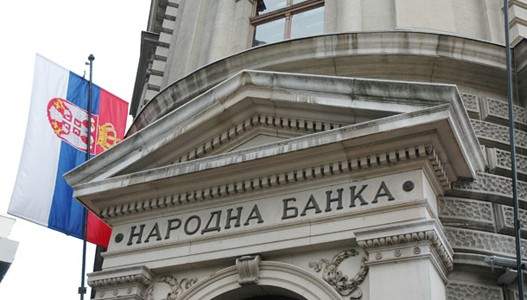On 20 February the
Serbian news service Beta reported that commercial banks in neighboring Montenegro Serbia
In 2007 the Central
Bank of Montenegro (Централна банка Црне Горе – CBCG) put into place all of the
legal measures necessary for banks in Montenegro to be able to join the NBS’s direct
payment system, but sources at the CBCG tell Beta that only two of the
country’s eleven banks chose to take part, and that both banks subsequently abandoned
the system because they found cheaper and more efficient payment alternatives.
The CBCG also
reports that – in the other direction – over the last five years banks in Serbia Bosnia and
Herzegovina Montenegro
In the month of January
2013 the NBS’s real-time gross settlement system (RTGS система) handled 10.23
million payments for a total of RSD 3,538.4 billion (€ 31.71 bln). During the same month the NBS’s clearing
system (клиринг система), which handles smaller payments (up to RSD 250,000 – €
2,240), handled 4.30 million payments, for a total of RSD 34.6 billion (€ 0.31
bln). Finally, the NBS’s system of
international and interbank clearing of foreign exchange payments (систем
међународног и међубанкарског клиринга плаћања у девизама) in January saw a
total of 2,556 foreign exchange payments for a total value of € 23.26 mln, with
23 participants. (One euro equaled 111.6013
RSD on 31 January 2013 )
Sources:
NBS payment system statistics for January 2013: МЕСЕЧНА
ИНФОРМАЦИЈА о раду RTGS система, клиринг система и система међубанкарског и
међународног клиринга плаћања у девизама за јануар
A day earlier, on
19 February Beta reported that Telenor d.o.o., Serbia Serbia
Telenor d.o.o. is 100%
owned by Telenor A/S of Denmark, which in turn is owned by Telenor Danmark
Holding A/S, part of Norway’s Telenor Group.
Sources:
Business registry info on Telenor d.o.o.: Претрага
привредних друштава: TELENOR D.O.O. BEOGRAD
On 18 February the Serbian
newssite eKapija published a statement by Abu Dhabi Serbia Serbia
First Gulf Bank
PJSC (شركة مساهمة عامة بنك الخليج الأول),
headquartered in Abu Dhabi (UAE), is the second largest lender in the UAE. The bank is owned 67% by Abu Dhabi
Sources:
Дунав
банка понуђена на продају Арапима? (2013-02-03)
In earlier news, on
12 February the National Bank of Serbia Belgrade Serbia
The association is
basing its case in part on Art. 3 of the EC’s Council Directive 93/13/EEC of 5 April 1993 , asserting that the article
implies that consumers are not liable for contracts they sign if possible major
adverse consequences are not explained to them in advance.
The central bank
stated that it would not be possible for it to participate as either an
intervener or a plaintiff in the suit, as Serbian law precludes the regulator
itself from either initiating or supporting either side in lawsuits involving
consumer rights.
Video about the lawsuit aired
on 9 February by RTS 2’s program
Potrošački savetnik (Consumer Advisor)
Sources:
NBS press release: Народна
банка Србије не може бити учесник у парничном поступку који је покренуло
удружење потрошача „Ефектива“ (2013-02-12)
Video: Prva kolektivna tužba protiv
banaka u Srbiji (RTS 2, 2013-02-09)
Website of consumer association “Efektiva”: Udruženje Bankarskih Klijenata Efektiva
Background: Hungary:
Controversial Swiss franc loan law goes into effect (2011-09-29)
Background: Bosnian
Borrowers Bemoan the Once Safe Swiss Franc (2011-09-09)
Background: Croatia’s
Swiss franc loan trap (2011-08-11)
Mark Pleas
[contact]

